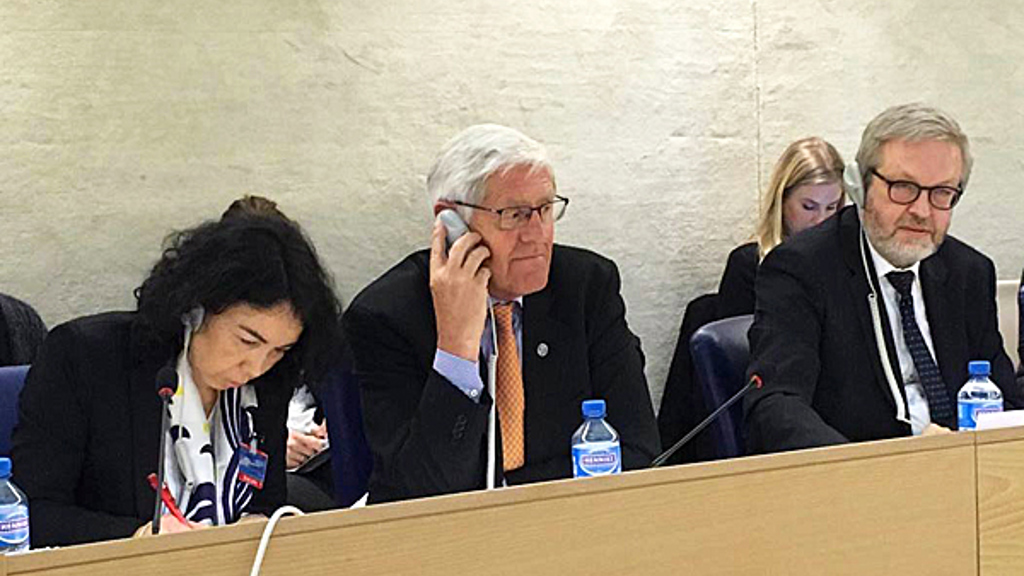
Føroyar vóru 21. januar til ST hoyring í Genéve. Tað var landsstýrismaðurin í Uttanríkis- og Vinnumálum, Poul Michelsen, sum umboðaði Føroyar til hoyringina. Hoyringin er liður í Universal Periodic Review (UPR) tilgongdini hjá ST.
Í framløgu síni segði landsstýrismaðurin m.a, at Føroyar eru framsøknar, tá ið tað snýr seg um mannarættindi. Tiltøk eru framd seinastu árini at stimbra javnstøðu í politikki, og nú síggjast úrslitini. Uppskot at broyta hjúnarbandslógina, so lógin eisini fevnir um tvey fólk av sama kyni, verður viðgjørt í Løgtinginum í løtuni. Harumframt hevur samgongan sett sær fyri at yvirtaka útlendingaøkið. Flóttafólk er partur av málsøkinum, og við at yvirtaka økið verða Føroyar førar fyri at gera sítt í mun til taka ímóti og hjálpa flóttarfólkum.
Millum tilmælini frá londunum í Mannarættindaráðnum var:
- at Føroyar dagføra revsilógina, soleiðis at parturin um revsing fyri neyðtøku er tíðarhóskandi
- at hjúnarbandslógin verður dagførd, soleiðis at samkynd kunnu ganga saman í hjúnarlag
- at ein óheftur Mannarættindastovnur verður settur á stovn í Føroyum
Støða skal nú takast til tilmælini, ið verða svarað, tá ið Mannarættindaráðið hittist aftur í juni.
Poul Michelsen, landssýrismaður sigur: “Vit fara nú at viðgera tilmælini, sum skulu svarast í juni, tá ið Mannarættindaráðið hittist aftur. Í fleiri umførum hevur verið víst á tørvin at seta ein óheftan Mannarættindastovn á stovn og tí havi eg í hyggju at seta skjøtul á tað arbeiði beinavegin.”
Røðan hjá landsstýrismanninum:
Mr. President, distinguished delegates,
I also wish to express my sincere appreciation to the Human Rights Council for the opportunity to participate in this dialog.
*
The Faroe Islands have chosen to be subject to seven UN treaties and have since 2004 actively engaged in submitting contributions to reports from the Kingdom of Denmark to UN treaty bodies.
As a self-governing part of Denmark, and as a separate jurisdiction, we consider the UN monitoring processes as a crucial element in the strengthening of human rights in the Faroes. The recommendations from the expert Committees are given serious consideration and have for example fed directly into the policy development on Children’s Rights and Disability Rights.
*
The Faroes are few in number - around 49,000 people; still we are ambitious when it comes to securing our citizens a decent standard of living and fundamental human rights.
As part of a globalized world we also have a responsibility internationally. It is my firm belief that we should take responsibility in dealing with the worst refugee crisis since the Second World War. Negotiations on assuming responsibility of Immigration and Border Control have been initiated between the governments of the Faroes and Denmark. We aim at having full responsibility of this area in the near future, and this way to be able to do our part in terms of helping and receiving refugees.
I will now turn to the national report with a few remarks regarding our national consultation procedure.
In preparations for this report, The Foreign Service organized a public hearing in the capital Tórshavn in May 2015. The hearing offered NGOs and the general public the opportunity to present their views on human rights in the Faroes.
The submissions and inputs received have served as essential elements in our preparation for today’s review and will continue to do so in the process ahead.
A list of human rights issues are addressed in the report regarding the Faroes, many of which have been raised during consultations with the civil society. However, the issues addressed are by no means exhaustive. Due to the limits of text space, not all issues have found their way to the final report.
*
Mr. President,
Let me touch upon some of the concerns that have been raised during the consultation process.
When it comes to housing for people with special needs, a huge step has been taken in the right direction with the establishment of new residential facilities.
The target group is young people between 14 – 24 years with severe mental illness who therefore need nonstop care. These young people have traditionally been offered housing and care abroad, typically in Denmark. But with this new initiative they now have a safe and suitable option in their own country.
Gender equality is also an issue that has been raised on many occasions. Measures have been taken to address the low participation of women in public committees and politics, and we are now seeing the results.
Over the past three general elections, the share of women in the Faroese Parliament has gone from less than 10% to over 30%, i.e. more than tripled. And for the first time in Faroese history there is complete gender equality on the executive level. Following the general elections in 2015, women’s representation in the Faroese Government increased from 1 out of 8 ministerial posts to 4 out of 8.
The issue of equality also relates to other areas. A proposal on amending the Marriage Law to allow same-sex marriages has been submitted to Parliament and has received the first reading. I sincerely hope the amendment will pass, so LGBT citizens in the Faroes will be able to enjoy the same civil rights as other citizens.
The Government is also working on amending the Penal Code. An amendment will be submitted to Parliament in the autumn where the Penal Code will be reviewed - with special focus on the chapter regarding sexual offences. This to make sure that the Penal Code meets present day standards.
Legislation on protecting victims of stalking will also be presented at the same time.
The Administration of Justice Act is also being reviewed. Amendments are needed and discussions have been initiated between Faroese and Danish authorities. One area of importance is strengthening the legal rights for persons in provisional detention.
Promoting and ensuring human rights is a dynamic and ongoing process. We highly appreciate such hearings as an opportunity for input and look forward to today’s review.
Thank you for your attention.
